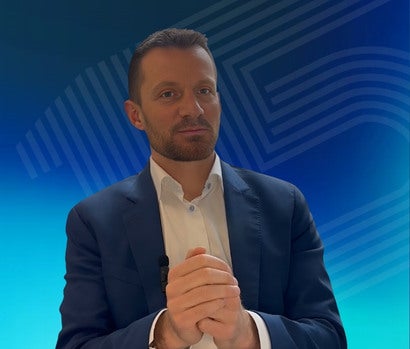In this edition of Member Spotlight, Guillaume Bonnel, CEO of the SDG Impact Finance Initiative (SIFI) sheds light on the initiative’s strategic approach to catalyzing impact investing. SIFI’s three-pronged strategy, focusing on innovation, scaling, and ecosystem building, aims to channel private capital towards achieving the Sustainable Development Goals (SDGs).
Guillaume Bonnel highlights the unique collaboration between public and private entities driving SIFI’s work, emphasizing the importance of systemic change in the financial industry. He also identifies potential areas of collaboration with ANDE, suggesting that by leveraging the network’s strengths, we can further our shared goal of supporting sustainable development through impact investing.

—What role does the SDG Impact Finance Initiative play in the SGB ecosystem?
—The SDG Impact Finance Initiative was initially created by the Swiss State Secretariat for Economic Affairs (SECO) and the Swiss Agency for Development and Cooperation (SDC), two institutions that are part of the Swiss government, as well as the UBS Optimus Foundation and Credit Suisse Foundation. These are now merging in order to mainstream impact investing. The goal is really to have private capital flowing into SDGs that are having an impact through financial mechanisms in the impact investing space.
We operate over three windows. The first one aims at fostering innovation through grants to innovative financial mechanisms in the impact investing space. The second one is here to scale up impact investing solutions through blended finance mechanisms. By investing in the first loss equity tranche of those funds, we help them de-risk the fund and attract more private capital for the SDGs (Sustainable Development Goals). And the third window is here to build the ecosystem for a conducive ecosystem for impact investing.
—How did you come to work at SIFI and impact finance?
—Actually, it all started with my first mission when I left for Nicaragua to build schools with a humanitarian organization. Coming back from Nicaragua, I ended up almost by chance in the financial industry, and from there, I decided, now that I’m here, to make this experience useful for bringing impact investing forward.
And that’s when I started developing sustainable finance and impact investing in two different banks. At some point, I realized that it was very important to have that systemic shift happening for impact investing to really become mainstream in those banks. And that’s exactly what the SDG Impact Finance Initiative is about and trying to achieve.
What excites me the most about this initiative is the idea that in the same organization, you can have a partnership between different governments, Switzerland and Luxembourg, but also private institutions like the UBS Optimus Foundation. Having a group of people that together manage to work around this initiative and make it work for the sustainable development goals in developing countries is extremely powerful.
—How can the SDG Impact Finance Initiative leverage ANDE’s network?
—The SDG Impact Finance Initiative ambitions to go beyond Switzerland to become truly international. We want to become the global platform for mainstreaming impact investing, and we are still working around those three windows. We would like to become a platform able to first initiate ideas, then help those ideas become real projects through feasibility studies and expansion grants, and then scale up those projects into real impact investing funds able to attract vast volumes on the market.
—Have you identified synergies with other ANDE members?
—ANDE and the SDG Impact Finance Initiative are part of the same value chain. We are trying to help the same ultimate companies, I would say, which are small, growing businesses having a positive impact. Only the SDG Impact Finance Initiative is on a different part of the value chain, trying to support financial mechanisms, attract private capital, and direct private flows of capital ultimately to those companies, and then ANDE is the network to support the same companies. But at the end of the day, I would say our objectives are very similar, only in different parts of the value chain.
Also, I think we are aligned on a number of sustainable development goals, just to name a few: gender equality, climate action, and decent work and economic growth are very important for the SDG Impact Finance Initiative as well as for ANDE, I think the network and ANDE can help us broadcast innovative solutions as well to the overall network. And collaborating with ANDE members can ultimately lead to innovative financing solutions, new partnerships, and greater impact in targeted SDG areas, reinforcing the SDG Impact Finance Initiative’s role in bridging the sustainable development goals funding gap.
—How can the SDG Impact Finance Initiative’s experience can help ANDE members address common challenges?
—The SDG Impact Finance Initiative and ANDE are two overlapping ecosystems that ultimately try to benefit the SDGs in developing countries. And so we do have similar objectives and synergies in ecosystem building, for instance, connecting those with the impact fund managers. So, one part of the community becoming the investor of the other. For instance, we could also collaborate in bettering access to finance, knowledge sharing, advocacy, and policy influence as well, which is part of our window three.
And also the objective of ANDE follows, and being part of the ANDE community means engaging with the global community dedicated to supporting the SDGs in developing markets. We can help the network by sharing all of the knowledge and the models that we’ve financed and supported through the SDG Impact Finance Initiative and bringing those new innovative financial models to the network so that they can also benefit from them. We could also benefit from knowledge-sharing activities and research from the ANDE network. That would help us also tailor better financial models for them to access private capital for the SDGs.
At the end of the day, I think this collaboration between SIFI and ANDE only emphasizes the importance of innovative financial solutions in achieving the SDGs, a shared goal of both organizations.
